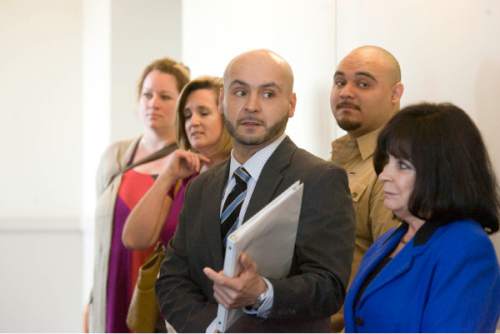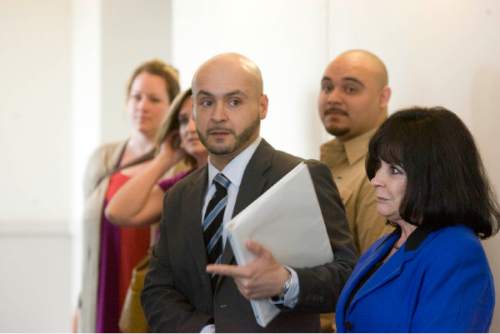This is an archived article that was published on sltrib.com in 2015, and information in the article may be outdated. It is provided only for personal research purposes and may not be reprinted.
A Colorado man's legal battle to gain parental rights for his son, who was born and adopted in Utah, has come to a halt because no one involved in the case lives here.
Fourth District Judge Claudia Laycock dismissed the case because Utah doesn't have jurisdiction. Neither of the boy's biological parents lives in Utah. And the child — who spent only eight days in the Beehive State following his birth — now lives in Illinois with his adoptive parents.
"Substantial evidence about the child's case, protection, training, and personal relationships is available in Illinois, not in Utah," Laycock wrote in her dismissal order, which was filed Wednesday.
The biological father, Bobby L. Nevares, and the birth mother, identified only as M.L.S., had a brief relationship that ended in January 2010 and from which she emerged pregnant. She told Nevares she planned to place the infant for adoption and he told her he was willing to parent the child, according to court records.
But the birth mother proceeded to contact two adoption agencies, the Adoption Center of Choice in Utah and Adoption Options in Colorado.
In mid-September 2010, the Colorado agency contacted Nevares and he visited twice, expressing his desire to take custody of the child.
But the birth mother, without telling Nevares, decided to work with the Utah agency. She arrived in Utah two days before giving birth on Sept. 29, 2010, and the boy was placed for adoption by the Utah agency a day later.
The Utah Supreme Court ruled in February that Nevares was improperly denied an opportunity to contest his son's adoption. Nevares preserved his parental interest in Utah by acting to do so in Colorado, according to the high court, which sent the case back to Laycock.
The Adoption Center of Choice has been at the center of a number of contested adoptions and whose license to operate in Utah was revoked by the state about a year ago.
The high court also rejected the argument that Utah law barred Nevares from contesting the adoption because the relationship with M.L.S. was a sexual offense in this state. Nevares was 20 when the child was conceived and the girl only 15, which could amount to statutory rape under Utah law.
The high court ruled that the sexual conduct took place in Colorado and thus fell outside of the jurisdiction of Utah law.
Justice Christine Durham also argued that the sexual conduct was legal in Colorado and that means Nevares had a constitutionally protected right to participate in his child's upbringing.
Attorneys representing Nevares and the adoptive parents did not immediately respond to requests for comment.
Twitter: @MikeyPanda





